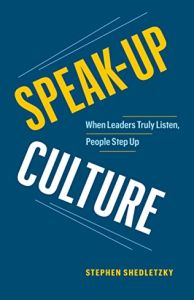Join getAbstract to access the summary!

Join getAbstract to access the summary!
Stephen Shedletzky
Speak-Up Culture
When Leaders Truly Listen, People Step Up
Page Two, 2023
What's inside?
Develop a speak-up culture so your people feel safe voicing their views.
Recommendation
In 2018 and 2019, two Boeing airplanes crashed after takeoff, killing everyone on board both flights. Stephen Shedletzky explains how Boeing could have prevented those fatalities by developing a culture where employees felt safe speaking up about their concerns. Shedletzky outlines how to build such a culture by selecting and supporting the best leaders, and how to scale up by attracting and retaining the right people. Whether helping avoid tragedy or boosting productivity, Shedletzky shows how speak-up cultures and the leaders who nurture them make the world a better place.
Summary
About the Author
Stephen Shedletzky is a thought leader, coach and adviser.

















Comment on this summary